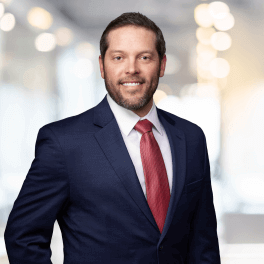Politics in the Workplace: Do NFL Players Have Freedom of Speech to Protest at Games?
It’s nearly impossible to turn on the TV and not hear something about the NFL player protests and whether such actions are protected speech under the First Amendment. While these protests started last season, they have grown and gained new attention this fall after President Donald Trump’s comments at an Alabama rally, and the President’s subsequent tweets directed at the players protesting during the playing of the National Anthem. In supporting the actions of the NFL players, pundits, commentators and even team owners have claimed that the athletes have a right to peacefully protest under the First Amendment to the U.S. Constitution, which guarantees freedom of speech. Are they right?
In reality, the First Amendment restricts only the government from abridging the freedom of speech; NFL players, as employees of private employers, leave their First Amendment free speech rights at the door. However, under some state constitutions, free speech rights may be broader than under the U.S. Constitution. Thus, the protests by NFL players cannot be prohibited by the government, but may be prohibited by their teams. As private employees, the NFL players are subject to the terms of their collective bargaining agreements, their employment contracts, contract law, and NFL rules, all of which could restrict their speech.
For example, according to one media report, the NFL Game Operations Manual states that the “National Anthem must be played prior to every NFL game, and all players must be on the sideline for the National Anthem. During the National Anthem, players on the field and bench area should stand at attention, face the flag, hold helmets in their left hand, and refrain from talking.” Pete Grathoff, There Is a False Rumor About the National Anthem in the NFL Rulebook, The Kan. City Star (Sept. 25, 2017). However, these are guidelines, not fixed rules.
The NFL Rule Book, however, does bar players from “wearing, displaying, or otherwise conveying personal messages either in writing or illustration, … which relate to political activities or causes, other non-football events, causes or campaigns, or charitable causes or campaigns.“ Official Playing Rules of the National Football League, Rule 5, Section 4, Article 8 (2017).
Notwithstanding a private employer’s rules, in California a private employer’s ability to control the political activities of its employees is limited. The law expressly prohibits employers from making, adopting or enforcing any rule, regulation or policy forbidding an employee from participating in politics, or controlling or directing an employee’s political activities or affiliations. Employers are also barred from firing or threatening to fire an employee in order to coerce him or her into any particular course of political activity. Cal. Lab. Code §§ 1101, 1102. Under California case law, the term “political activities” includes all activities that may indicate support for a particular candidate or political cause.
But how far does this protection go? Where is the line drawn between a private employer’s right to regulate speech in the workplace and avoid customer complaints, and an employee’s right to their political views?
Public employers have a limited ability to control the political activities of their employees. For example, a public agency may limit the political activities of employees if it would interfere with the efficient administration of the agency’s duties.
While a private employer cannot forbid an employee from engaging in political activity outside of the workplace, the situation is less clear when an employee intentionally brings his or her political activism into the workplace, especially when it upsets customers or detracts from the business.
In the case of the NFL players who kneel in silence, it is not clear to all what they are protesting, what changes they want, or whether their silence constitutes some form of political activity. But even if kneeling in silence during the National Anthem is manifestly political speech, a private employee’s political activities at work may not be protected if they interfere with the performance of the employee’s job or significantly disrupt the employer’s business. Given the boos at recent games and apparently lower viewership for some games in the past week, NFL teams may have a good argument that workplace disruption and customer unhappiness outweigh whatever political aims the players may have been attempting to achieve. Put another way, a court may need to weigh an employee’s right to engage in political activities (at least in California) against an employer’s right to conduct its business without disruption.
In addition, politically neutral policies and procedures, like a workplace conduct policy, when consistently enforced and uniformly applied may be utilized to prohibit certain displays or conduct. This is a common sense approach because otherwise any private workplace could become a forum for employees to test the limits of political expression to the detriment of their co-workers and the business.
Not all activity is political, and not all political activity is protected. Employers presented with a situation that toes the line between borderline acceptable workplace activity and political activity should call a timeout and evaluate the situation. Try to understand the purpose behind the activity. If the activity is nonpolitical and there is a policy or procedure covering workplace conduct, employers may prohibit further action. If the activity is political, but disrupts the workplace, proceed with caution. If the activity is clearly political but not disruptive, it is better to wait on the sideline than get flagged for a violation.

